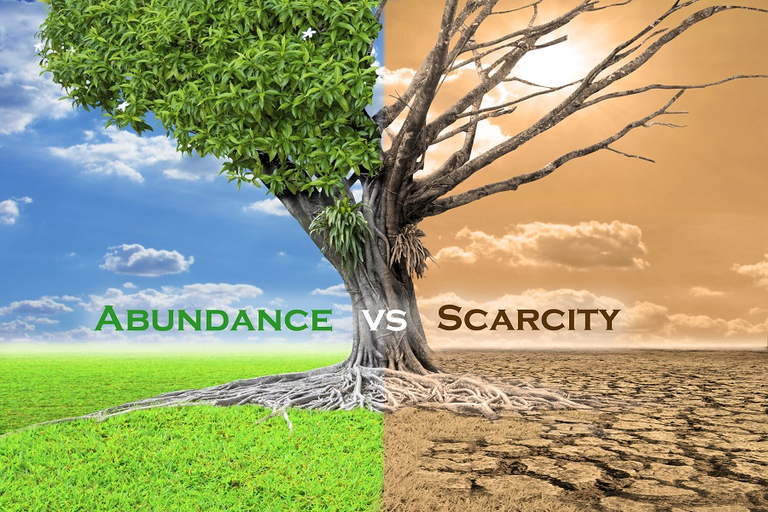
Every once and a while it's good to step back and ask what we really want.
Do you know what you want?
Are you sure?
What would happen if you got what you want?
Would you simply want something else in its place?
Is "want" a void that can never be truly filled?
Is it like people who complain?
No matter what a person has there's always something to complain about.
Is the thirst for more power unquenchable?
More more moar!
Is everything we know rooted in a scarcity mindset?
How does one break free of that?
The world is saturated in unrealized potential.
How many citizens of the world out there have something truly unique and valuable to contribute to the world but simply never do? How many people always have their heads down working some corporate job making someone else rich? How many people come home at the end of the day with zero energy for anything else, including maintaining their own health? We don't even have to drive to get fast-food cancer anymore. Just DoorDash it friend!

Abundance is weird.
Scarcity is the standard; it is what mother nature intended. In a very real sense, scarcity creates balance and forces the wilderness into submission. The exponential growth cycle guarantees this inevitable outcome. Whenever resources are abundant life finds a way to expand in an ironically destructive manner. Before we know it those seemingly infinite resources dwindle to nothing and the laws of nature must be rebalanced, more often than not in a harshly painful way.
Humanity must evolve path past the lizard brain.
We must create our own balance or the universe will continue to punk us into submission by force as it always has done. Are we capable, as a species, of actually achieving such a state of being? Absolutely not if we continue to put people in charge of other people. It has been shown time and time again that this is a consistently losing strategy that at best can never last beyond a single generation.
Ideals themselves must be in charge.
Such a state is difficult to achieve given the dynamic nature of our environment. When everything is changing a certain intelligence is required from a leadership standpoint. Otherwise we'd all be flying blind and unable to change course even in the face of complete systemic failure. Jumping off a cliff isn't much of an option without a parachute.
Ideas are much harder to kill.
This is why Bitcoin is an interesting model for achieving the most basic kind of governance possible. It simply tries to achieve one tiny little use-case and nothing else; sending value from one person to another on the Internet without having to get permission from the government.
Every derivative of Bitcoin tries to take this model one step further. It took what was done and tries to improve it in one way or another. Bitcoin is the building block upon which all other cryptocurrencies were fabricated. While many see it as the old Grandpa of the space, it's actually just a teenager. Imagine a 4 year old trying to tell a high-schooler that they're old and out of touch. Yeah, that's not how it works. The 4-year-old is talking nonsense.
Respect your elders!
Of course I say this tongue in cheek, because let's be honest, there's not a single billionaire in crypto that deserves any respect. They're all greedy charlatans talking a big game while never making the necessary sacrifices to actually transition to an abundance based mindset. Ironically, all billionaires are firmly rooted in scarcity. There's no other way to actually become a billionaire other than to embrace scarcity and siphon the lifeforce away from your fellow man en masse through a million employees trading their time for money and signing away all rights to the means of production. Crypto hasn't solved this issue yet.
Keywords to lookout for:
Competition
Anyone who frames anything as a competition in crypto does not understand the open source narrative nor the cooperative nature of the space. Open source code can not compete by design because anyone can use it for their own thing. Bitcoin maximalists magically believe that the tech stack they've designed can not be replicated by another asset even though it provably has been dozens of times.
They use magical thinking like infinity divided by 21 million, as if to say the entire world will be forced into submission to use Bitcoin and only Bitcoin not matter how crowded or ridiculous the network becomes. Obviously this is the antithesis of the entire concept of decentralization, but they simply do not care that their entire worldview is a paradox.
In an extension of this truth, it's quite easy to divine that crypto can not "compete" with fiat currency. We all made a big mistake in conflating the word "disrupt" with ones like "compete", "replace", and "killer". Crypto has already succeeded in disrupting legacy systems, and look what happened. The legacy systems are now using crypto. While it's unlikely that CBDCs gain any traction whatsoever, it's almost a guaranteed fact that crypto can be used as the pristine collateral required to mint more fiat debt.
Centralized
Have you noticed that all centralized crypto platforms are assumed to be complete failures? Does this mean that all stocks are also complete failures? Does this mean all governments are complete failures? The world has already proven that centralized power structures can still be a massive success, especially on shorter timelines. In fact I would argue that centralized corporations are undead zombies that will live as long as they have brains to eat. A corporation can probably live longer than any crypto, as cryptocurrencies will likely live as long as the people that use them.
So of course it's disappointing that such and such whatever has potential attack vectors it's still not much of an indication of what will actually happen. Steem was centralized. Look what happened. These things happen. Surely the chance for failure is high, but that's true for pretty much everything.
Moonboy
Yes of course it would be nice to have enough money to not need to worry about the future, but how does that theory actually work out here in reality? Images of Lambos and overpriced multi-million dollar houses come to mind. Unsustainable status racing is not something one would do if they lived in abundance. Easy come, easy go, is not the mantra of crypto, regardless of what all the moonboys are saying.
Conclusion
Crypto is full of pretenders, and that's disappointing. However, I have faith that as time progresses reputations will continue to diverge and separate the chaff from the wheat. At a certain point the next fad in crypto simply isn't going to matter, and regulation will be pointless because all the best stuff already exists for the most part. We need more devs working on networks that already exists rather than trying to constantly trying to reinvent the wheel. All in good time.